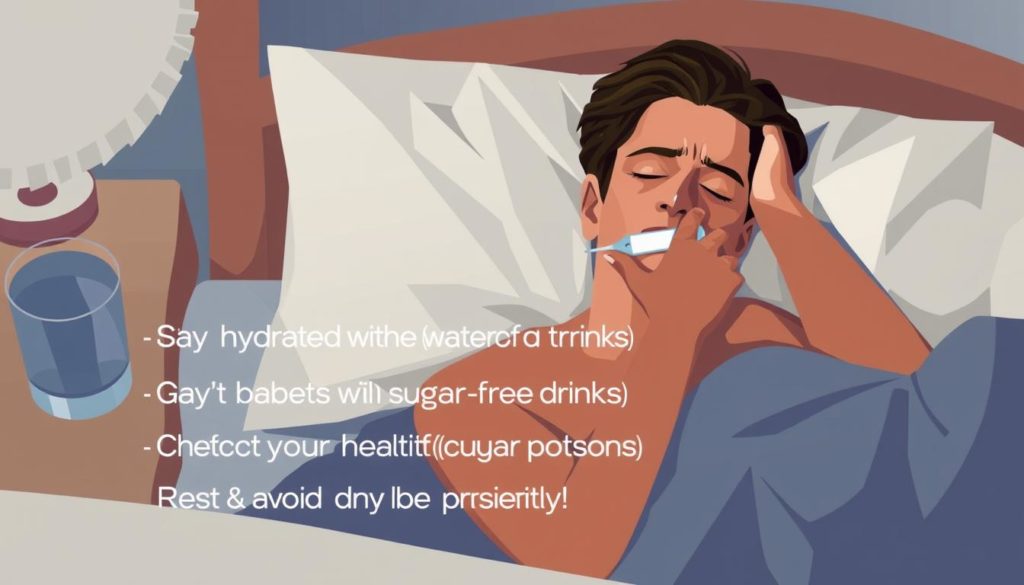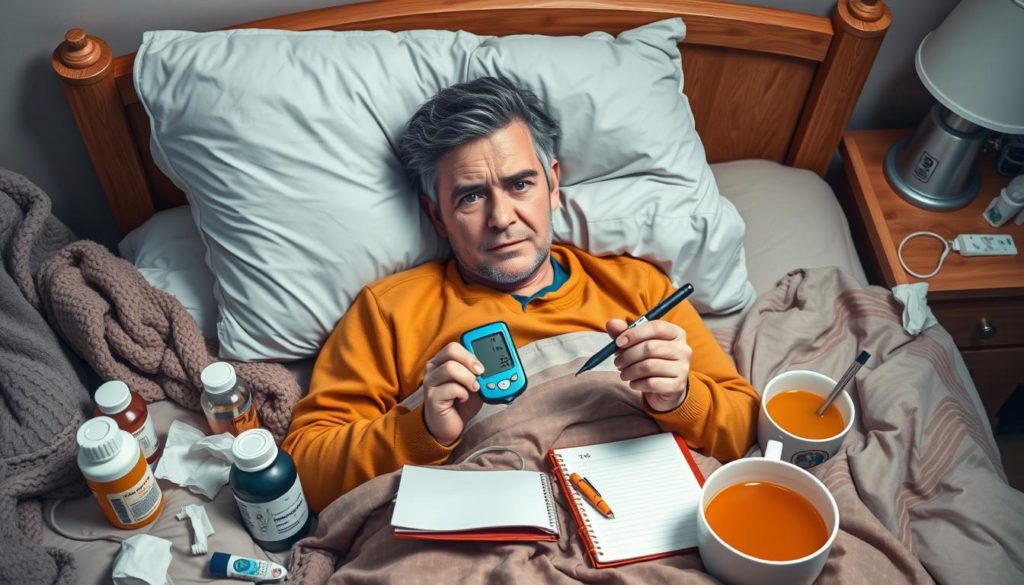Did you know up to 80% of people with diabetes face big changes in their blood sugar when sick? Managing sick days is key for your diabetes control plan.
Being ill can mess up your eating habits, due to nausea or a poor appetite. This makes it hard to keep blood glucose in check. Also, illness raises your glucose levels because of how your body reacts hormonally.
Being ready ahead of time makes a big difference. Having a plan and the right supplies for sick days helps a lot. Let’s explore how to manage diabetes wisely on sick days, to keep your health stable.
Introduction to Sick Days with Diabetes
Living with diabetes demands careful control over blood sugar levels. But sick days bring extra hurdles. Your body needs more energy when you’re ill. This can make your blood sugar levels jump around. Knowing the diabetes sick day rules is essential during these times.
Sick days require a good grasp of diabetes care during illness to avoid complications. Whether it’s a flu, a cold, or a stomach bug, being aware and adjusting your diabetes plan is necessary.

Being prepared is crucial for handling sick days. Understanding your diabetes sick day rules is key to managing your diabetes well. It’s important to check your blood glucose more and drink plenty of fluids during these times.
Having a sick-day kit ready is a smart move. Fill it with things like extra glucose meters and test strips. Add your healthcare providers’ contact details too. This kit, combined with knowing how to care for your diabetes when ill, gives you confidence and control.
Prepare Now Before Getting Sick
Getting ready before you get sick is very important for people with diabetes. A good plan for sick days with diabetes means you have everything you need. This will help you stay healthy and manage your diabetes when you’re ill.

Essential Supplies
It’s very important to have your medical supplies ready ahead of time. Have things like insulin, diabetes medicine, ketone test strips, and a good thermometer. These things will help you watch your sugar levels and avoid any problems.
Recommended Foods
It’s important to have the right food ready for sick days. Make sure you have easy foods like sports drinks, crackers, applesauce without sugar, and instant pudding. They help you get enough carbs, about 50 grams every four hours, when you can’t eat regular meals.
If You Get Sick
Dealing with illness when you have diabetes is a challenge. It’s crucial to follow diabetes sick day guidelines. They help make the process easier and improve health outcomes. The key is managing both your diabetes and your illness carefully.
“Keeping track of your blood glucose levels every four hours is crucial,” advises the American Diabetes Association. “Especially when blood sugar levels become erratic due to illness.”
Here are some essential steps to take:
- Monitor Blood Sugar: Check your blood glucose every four hours with a reliable meter.
- Medication: Keep taking your usual diabetes medications unless your doctor says to stop.
- Hydrate: Drink lots of fluids. Try to drink a glass of water every hour if you can.
- Check for Ketones: If your blood sugar goes up a lot, test for ketones to avoid diabetic ketoacidosis.
Following a strict plan is crucial, especially for drinking enough fluids. Here’s a guide to what you can drink:
| Type of Fluid | Benefit |
|---|---|
| Water | Keeps you hydrated without adding sugar or calories. |
| Broth | Gives you fluids and electrolytes, which is great if eating is hard. |
| Herbal Tea | Calms your throat and helps you stay hydrated. |
| Electrolyte Drinks | Restores important salts and minerals lost during illness. |
By sticking to these guidelines, you can handle your diabetes better and cut down complications from getting sick.
Importance of Hydration
Staying hydrated is key, especially when dealing with diabetes and illness. It’s an essential part of a diabetes sick day plan. It helps manage symptoms and prevent complications. When you’re sick, your body needs to work well, and staying hydrated helps.
Drinking Water
For anyone, especially those with diabetes, water is the best way to stay hydrated. Staying hydrated helps keep your blood sugar levels stable. Experts suggest drinking at least eight glasses of water daily, but everyone’s needs are different.
Alternative Fluids
Besides water, other drinks can help you stay hydrated too. When sick with diabetes, think about including:
- Sugar-free drinks: These keep you hydrated without extra sugar.
- Broth: It’s good for its electrolytes, helping balance your body’s fluids.
- Electrolyte solutions: Made to stop dehydration, they’re useful when you’re ill.
Adding these options provides variety while meeting hydration needs for diabetes management.
When to Call Your Doctor
When you have diabetes and are sick, it’s very important to know when to call for help. You need to keep your blood sugar levels steady. It’s also key to avoid getting really dehydrated or facing other serious issues.
If you’re sick and have diabetes, reach out to your doctor quickly if:
- Your blood sugar stays high and your medication doesn’t help.
- You can’t drink enough fluids, which might lead to bad dehydration.
- You have bad symptoms like throwing up or loose stools.
- You find ketones in your pee, a sign that could mean diabetic ketoacidosis.
Taking charge of your health when you’re sick can really cut down diabetes risks. Getting help early helps avoid bigger health troubles and helps you get better faster.
By knowing when to contact your doctor, you can lower the stress and problems of sick days. This makes managing diabetes easier on those tough days.
Managing Blood Glucose Levels
When you’re sick, controlling your blood glucose can be really hard. Your body makes hormones that push up your blood sugar. So, it’s very important to know what to do ahead of time. By following diabetes sick day rules and working with your doctor, you can be prepared.
Increased Monitoring
Sickness can make your blood sugar go all over the place. You should check your blood sugar more often when you’re not feeling well. This way, you can catch any highs or lows quickly and deal with them right away.
Maintaining Target Range
Keeping your blood sugar in the right zone is crucial, especially when you’re sick. Making sure you stay in your set range reduces the chance of bad side effects. If your blood sugar drops, eat some simple carbs, and don’t forget to drink plenty of water. Following the diabetes sick day guidelines is key.
Talking to your doctor before you get sick is a smart move. This plan makes dealing with diabetes easier when you’re unwell. Having a sick-day kit ready is also a good idea.
Understanding Diabetic Ketoacidosis (DKA)
Diabetic Ketoacidosis (DKA) is a serious issue for people with diabetes. It happens when diabetes isn’t managed well. DKA causes high ketone and blood sugar levels. This can lead to dehydration. In severe cases, it can cause a coma.
Risk Factors
Skipping insulin shots and high blood sugar are big risks for DKA. Knowing these risks helps prevent it. It’s vital to follow diabetes sick day guidelines. This helps manage diabetes during illness.
Prevention
To prevent DKA, check your ketones when you’re sick. Drinking lots of water is important. So is taking insulin as you should. Following diabetes sick day rules lowers the risk of DKA. Stick to your diabetes and sickness protocol. This helps you manage diabetes, even when you’re sick.
Managing Sick Days with Diabetes
When you have diabetes, managing sickness is key. It helps to keep blood sugar stable and maintain your health. When you get sick, your body reacts in a way that can make blood sugar levels swing. It’s vital to have a clear plan for these days to manage better.
Here’s how to handle sick days with some essential diabetes management tips:
- Adjust Medications: Always follow your doctor’s advice on changing your meds when you’re sick. Staying on track with your medication helps avoid more problems.
- Consistent Monitoring: Check your blood sugar more often when sick. This lets you quickly deal with high or low levels.
- Adequate Hydration: Being sick can make you dehydrated, which isn’t good for sugar levels. Drink lots of fluids, but skip the sugary ones.
- Dietary Adjustments: You might not feel like eating much, but it’s important to get enough carbs. Eating small meals often can help keep your energy and sugar levels right.
- Seek Medical Attention: If you’re unsure about handling sick days, call your doctor. Some symptoms, like throwing up a lot or having trouble breathing, need immediate care.
Having a sick day plan that fits your needs can give you more control and ease your mind. By sticking to these diabetes management tips, sick days can be easier on your health.
When to Go to the Emergency Room
It’s key to know when to rush to the emergency room if you have diabetes. Recognizing these important signs and acting quickly is part of managing complications from diabetes.
Severe dehydration or not being able to keep fluids down are major warnings. Don’t ignore ongoing vomiting or diarrhea that stops you from retaining fluids.
If you’re losing weight fast while sick, it’s a worry and needs close watching. Very high or very low blood sugar levels that don’t get better with your usual care also need urgent medical help. This is to prevent serious problems.
Signs of Diabetic Ketoacidosis (DKA), like breath that smells fruity, feeling confused, or breathing fast and deep, mean you need emergency care. These are serious warning signs in managing diabetes and illness, and getting help fast is crucial for your health.
Knowing and acting on these signs quickly can really make a difference for those with diabetes when they get sick.
Creating a Sick-Day Kit
Getting ready for unexpected illness is wise if you have diabetes. A ready-to-go kit means you won’t have to rush to find supplies when you’re sick. This helps you stay on top of your care, even when you can’t get to the pharmacy easily.
Important Items
A good kit starts with key items. A trustworthy glucose meter is essential to keep an eye on your sugar levels. Make sure to include spare test strips and batteries. Ketone test strips are vital too, for spotting diabetic ketoacidosis (DKA), which is dangerous. Add in safe over-the-counter meds like acetaminophen or ibuprofen to manage fever and pain without messing with your sugar levels.
Medications
Your kit should have a week’s worth of diabetes meds. Stock insulin and any other medications you take. List all your meds and their doses, and have extras of important ones. This ensures you stay calm and can manage your diabetes, even if you feel unwell.
FAQ
What are the essential supplies needed for a diabetes sick day plan?
For your sick day kit, pack insulin and diabetes meds. Include ketone test strips, a reliable thermometer, and a glucose meter. These items help you control your diabetes if you get sick.
What foods are recommended during illness for someone with diabetes?
Sports drinks, crackers, and unsweetened applesauce are good. Instant pudding also helps. They give you about 50 grams of carbs every four hours. This is if you’re too sick to eat regular meals.
How frequently should blood sugar be monitored when sick?
Check your blood sugar every 4 hours. During sickness, monitoring helps manage diabetes. It helps adjust treatment if sugar levels change.
Why is hydration crucial for diabetes management during illness?
Water and sugar-free drinks keep your blood sugar stable and prevent dehydration. Broth and electrolyte solutions are also good choices. They help avoid blood sugar spikes caused by dehydration.
When should you call your doctor during an illness?
Call your doctor for high blood sugar, trouble keeping fluids down, or if you’re vomiting a lot. Also, call if you have diarrhea or find ketones in your pee. These are signs of complications.
What is diabetic ketoacidosis (DKA) and how can it be prevented?
DKA is a dangerous condition with high ketones and blood sugar. It’s often due to not enough insulin. Checking your ketones often and following sick day rules for diabetes can prevent DKA.
What items should be included in a diabetes sick-day kit?
Your kit needs a glucose meter and ketone test strips. Pack your medicine for a week and safe over-the-counter meds. This makes handling diabetes easier when you’re sick.
What are the signs you need to go to the emergency room when managing diabetes during illness?
If you’re really dehydrated, throwing up a lot, or have diarrhea, go to the ER. Also go for rapid weight loss or very high or low blood sugar. If you see signs of DKA, it’s emergency time. Quick treatment is crucial.


